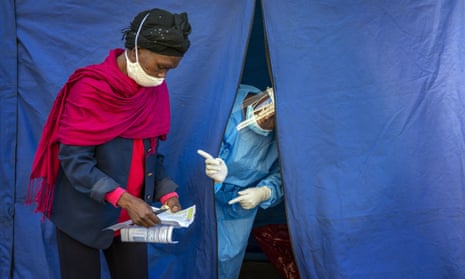The global scheme to deliver Covid-19 vaccines to poorer countries faces a “very high” risk of failure, potentially leaving billions of people with no access to vaccines until as late as 2024, internal documents say.
The Covax scheme has been beset by a number of issues, including a shortage of doses of approved vaccines, and a decision by India’s Serum Institute, which was initially earmarked to supply Covax, saying it would prioritise supplying India first.
The cheaper and easier to transport vaccines that the scheme has banked on, including the Oxford University-AstraZeneca vaccine, have been slower in testing and getting regulatory approval.
The bleak warning is contained in a financial risk assessment commissioned by Gavi, an alliance of governments, drug companies, charities and international organisations that arranges global vaccination campaigns and is the WHO’s partner in the Covax scheme.
To meet its target of vaccinating at least 20% of people in poor countries next year, Covax says it needs $4.9bn in addition to $2.1bn it has already raised.
That assessment is not shared by insiders at the World Health Organization, which represents one of the three pillars of the Covax scheme, who point out that negotiations with pharmaceutical companies so far not signed up to the scheme, as well as with individual countries to supply excess doses, are still ongoing, with new announcements on the scheme expected shortly.
The Covax programme is the main global scheme to vaccinate people in poor and middle income countries against the coronavirus.
It aims to deliver at least 2bn vaccine doses by the end of 2021 to cover 20% of the most vulnerable people in 91 countries, mostly in Africa, Asia and Latin America.
But in internal documents leaked to Reuters, Gavi says the programme is struggling from a lack of funds, supply risks and complex contractual arrangements, which could make it impossible to achieve its goals.
“The risk of a failure to establish a successful Covax facility is very high,” says an internal report to the board of Gavi.
The report and other documents prepared by Gavi are being discussed at board meetings on 15-17 December.
The failure of the facility could leave some people without access to vaccines until 2024, one of the documents says.
The risk of failure is higher because the scheme was set up so quickly, operating in “uncharted territory”, the report says. It also warns that issues with contracts that allow countries to back out of buying doses they have committed to could push up the cost of doses from the $5.20 benchmark and ultimately make the scheme no longer viable.
“Current risk exposure is deemed outside of risk appetite until there is full clarity on the size of risks and possibilities to mitigate them. It therefore requires intensive mitigation efforts to bring the risk within risk appetite.”
While some pharmaceutical companies working on vaccines, including AstraZeneca, have signed up to provide the vaccine at cost, other potential producers have yet to sign up to Covax. Wealthier countries, who have often invested in vaccine development, have pre-booked many of the early batches of vaccine.
Covax’s plans rely on cheaper vaccines that have yet to receive approval, rather than vaccines from frontrunners Pfizer/BioNTech and Moderna that use more expensive new mRNA technology.
The Pfizer vaccine has already been approved for emergency use in several countries and deployed in Britain and the US, and the Moderna vaccine is expected to be similarly approved soon.
Covax has so far reached non-binding supply agreements with AstraZeneca, Novavax and Sanofi for 400m doses, with options to order several hundred million additional shots, one of the Gavi documents says.
But the three companies have all faced delays in their trials that could push back some possible regulatory approvals to the second half of 2021 or later.
Gavi hired Citigroup last month to provide advice on how to mitigate financial risks. The issue of the complexity of contracts for vaccines has been known for some time, with experts concerned by the lack of transparency over the precise arrangements to supply vaccines and timing.
Asked about the documents, a Gavi spokesman said the body remains confident it can achieve its goals.
“It would be irresponsible not to assess the risks inherent to such a massive and complex undertaking, and to build policies and instruments to mitigate those risks,” he added.
Citibank said in a statement: “As a financial advisor, we are responsible for helping Gavi plan for a range of scenarios related to the Covax facility and supporting their efforts to mitigate potential risks.”
On Tuesday, a WHO senior official said the agency was in talks with Pfizer and Moderna to include their Covid-19 vaccines as part of an early global rollout at a cost for poor countries possibly lower than current market prices of almost $20 a dose.
Other shots are being developed worldwide and Covax wants to expand its portfolio to include vaccines from other companies.
Reuters contributed to this report.
